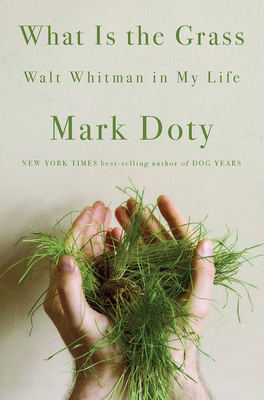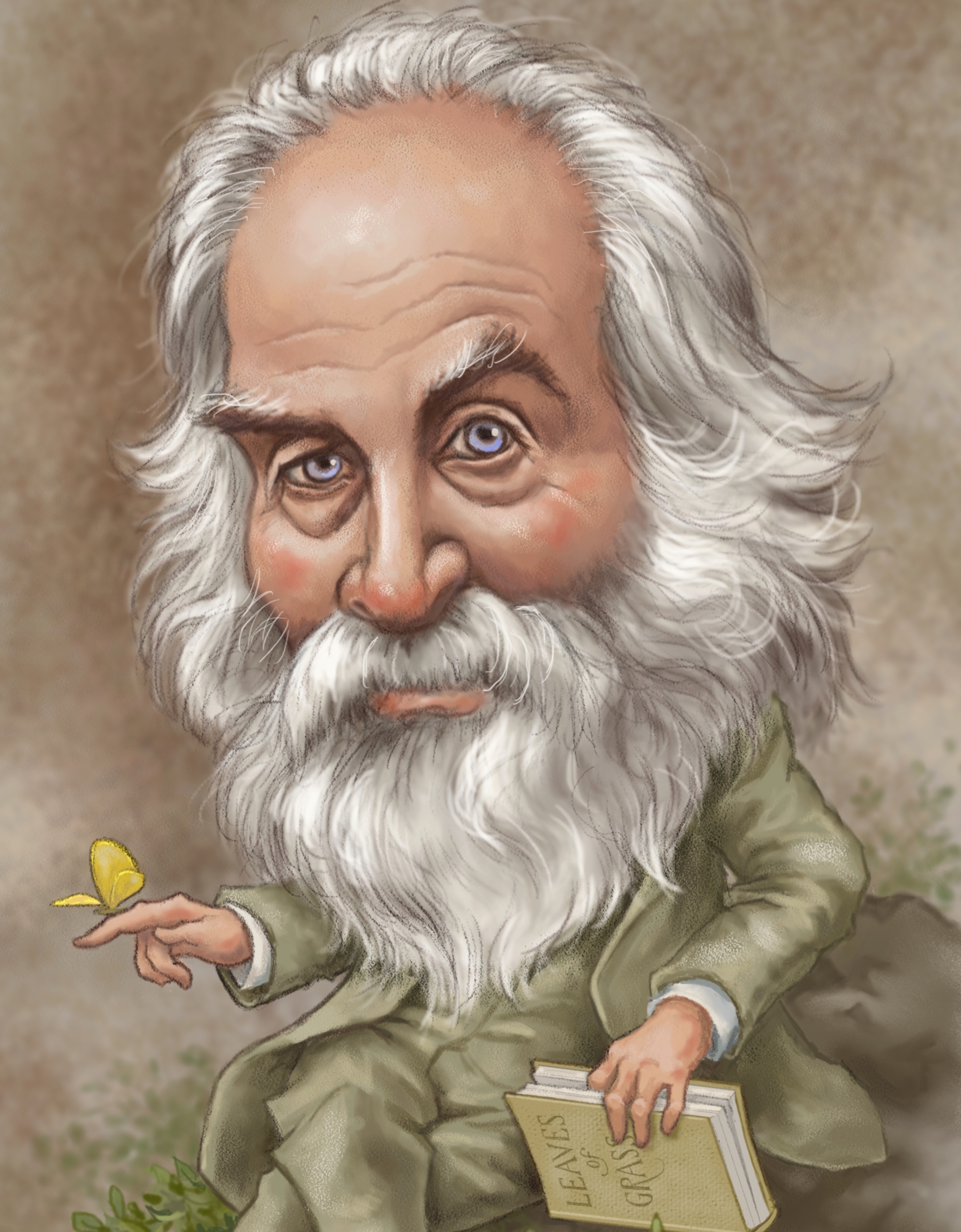 What Is the Grass: Walt Whitman in My Life
What Is the Grass: Walt Whitman in My Life
by Mark Doty
W.W. Norton. 288 pages, $25.95
IN What Is the Grass, a dazzling and discursive meditation on Walt Whitman’s poetry, Mark Doty sets out to “see and say” all that his attention is drawn to—both the poetic and the personal—“lifting experience in the direction of another dimension of time, where everything I have loved can be known again, more fully, that my joy in it might increase.” If this kind of language seems extravagant, it’s because Doty, winner of the National Book Award for Poetry, is our poet and essayist of the extravagant beauty of the world. That quality extends to his endless delight in Whitman.
He exults in Whitman’s “intelligence and scope, the sly wit and visionary luminosity” of the poems, the “evangelical urgency.” The Good Gray Poet’s work embodies, he says, “two essential human experiences … the joyous and burning fact of being a desiring body among other bodies; and the sense that, at its core, the self is without boundary.”
The book focuses on Whitman’s magnum opus, Leaves of Grass, which its author spent almost forty years “hackling at,” starting in 1855, with each edition larger than the last, until the volume contained over 400 poems. Doty calls this “hefty, encyclopedic” book “a great spiraling tour of a personality, flush with its obsessions and desires, both overt and repressed, a catalog of the information and evidence the world brings to the speaker’s body, a guide to what he loves, a consideration and recasting of the idea of selfhood, and a meditation on what can be said and what cannot.” (Be prepared for breathless sentences like that!) Whitman’s “new gospel”—one of “the most courageous American poems” of the 19th century—not only elevated colloquial speech “into an astonishingly flexible, workable tool for poetic discourse” but managed to express “the first open inscriptions of same-sex love since the Renaissance,” producing poems that “have never lost their power to startle.”
Doty organizes his book around what he identifies as the five sources that fed the creation of Leaves of Grass. The first source was Whitman’s “boundless identification with all of life.” “I am not contained between my hat and my bootsoles,” he famously proclaimed. Indeed, “the poem wishes to free you from the illusion that you’re separate; it wants you to remember what you know, already, on some level: that you are me. Or, more precisely, we are it.”
This kind of quasi-mystical talk reminds me of the great English Buddhist, Alan Watts, and of the Zen and Hindu masters who inspired him. In fact, Whitman read Vedanta, and Doty does not shy away from claiming that the poet was “a homespun American Avalokitešvara,” an enlightened being who forgoes the state of Nirvana until all sentient beings are enlightened.
 Whitman’s poems are also “fiercely sexy,” and this brings Doty to the second source of the poem: the power of desire. For him there is no question but that Whitman was “a queer poet in the deepest sense of the word: he destabilizes, he unsettles, he removes the doors from the jambs.” In this, the longest section of the book, he extols Whitman’s “risky freshness” with its emphasis on the “love of comrades,” “manly attachment,” and “athletic love.” He shares his astonishment at how his fellow poet, in composing Leaves of Grass, managed to step away from everything he had previously done in verse and become “a poet solely devoted to singing his love for another man.” And despite the fact that in later editions of the poem Whitman suppressed some of the more blatantly homoerotic elements, he “persisted in importing the unnamed into the public world of the sayable.”
Whitman’s poems are also “fiercely sexy,” and this brings Doty to the second source of the poem: the power of desire. For him there is no question but that Whitman was “a queer poet in the deepest sense of the word: he destabilizes, he unsettles, he removes the doors from the jambs.” In this, the longest section of the book, he extols Whitman’s “risky freshness” with its emphasis on the “love of comrades,” “manly attachment,” and “athletic love.” He shares his astonishment at how his fellow poet, in composing Leaves of Grass, managed to step away from everything he had previously done in verse and become “a poet solely devoted to singing his love for another man.” And despite the fact that in later editions of the poem Whitman suppressed some of the more blatantly homoerotic elements, he “persisted in importing the unnamed into the public world of the sayable.”
It is here that Doty opens up about the history of his own sexuality, “the mystery of desire,” which, he confesses, has until now felt “unwriteable.” “What other,” he asks, “has the deep lodestone pull that sex has?” He indulges in some risky freshness of his own: descriptions of his forays into sex clubs, leather bars, and bathhouses; lists of hook-ups; candid appraisals of love affairs and marriages that fizzled; and pæans to the erotic charge he has found in “the flashing masculine currents and shoals Walt Whitman also enjoyed.”
The satisfactions and pleasures of the city of New York—its “great, symphonic fullness”—became Whitman’s third inspirational source. The metropolis, “so big and ambitious and forward-looking,” offered the poet, as it currently does Doty, a “high-octane mix of exhilaration, community, anonymity, adventure, and joy.” The crowds, the permissiveness, the dark piers of the city—Doty sees it all as one more wellspring of Whitman’s celebration of “being numerous.”
In rising to the challenge of making something coherent of the burgeoning abundance of his experience, Whitman burst forth with the “splendid flood” of a new vocabulary, a language that tried to reconcile spoken American English “with Isaiah and Matthew, Shakespeare, Marlowe and Milton.” Doty identifies the radical newness of his language, a lexicon that accommodated words and phrases “that simply would not have appeared in poetry written in the English language before 1855,” as the fourth source of Whitman’s poetry.
Whitman declared that his poems “awakened from that hour” when he felt the grief of mortality. This awareness of death, of the world “saturated with death,” is the fifth source for Leaves of Grass. It opened Whitman to a concern with “how he might extend himself ever so many hundred years hence.” Doty underscores Whitman’s pleasure in being “some version of immortal” and his “happy intimacy” with his future readers. “The poem,” he says, “sails on into heaven.”
One of the things that makes Doty’s book so magnificent is the fact that our guide is himself a great poet, one who understands intimately how poems “work.” Even Whitman’s stanza breaks come under careful scrutiny. In its very stops and starts, the poem seems to “build a model of consciousness, a dramatic presentation of the self engaged in experience.”
Doty is very good at examining multiple versions of the same poem. And he has insightful things to say about other poets, especially Whitman’s contemporary, Emily Dickinson. He’s not above the occasional humorous aside, too, as when he notes that, despite his inclusivity, Whitman “could not keep his mind on women, even for the duration of a few poems.” He is also open-eyed about the poet’s occasional “windy rhetoric and gnarled syntax.”
Toward the end of the book, Doty is at his most personal and candid. Here he writes beautifully of his current relationship with a man named Ethan. What started as an on-line hookup became—“through a kind of alchemical process I can’t claim to explain”—something more. “We spent a long time coming to know one another physically, in the present tense, and from our bodies all else has proceeded.” Doty connects his being in love (“poor shorthand for a range of feelings”) with his rhapsodic, probing examination of “Crossing Brooklyn Ferry,” the “most uncanny of American poems.”
It is the hauntingly radiant aliveness of Whitman’s great work that is ultimately Doty’s message. In this homage to a poet whose voice has become a “permanent presence” in his head, he has written a masterpiece, one that is as rapturously fine as the book he so lovingly and intelligently elucidates.
Philip Gambone is a regular contributor to this magazine. His profile of Mark Doty appeared in his book, Travels in a Gay Nation(2010).





